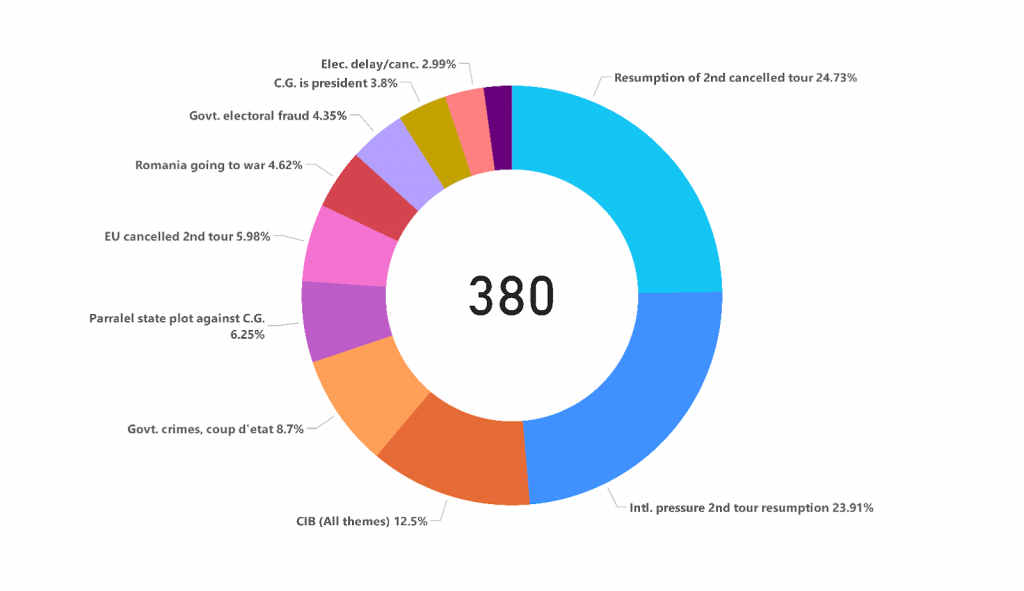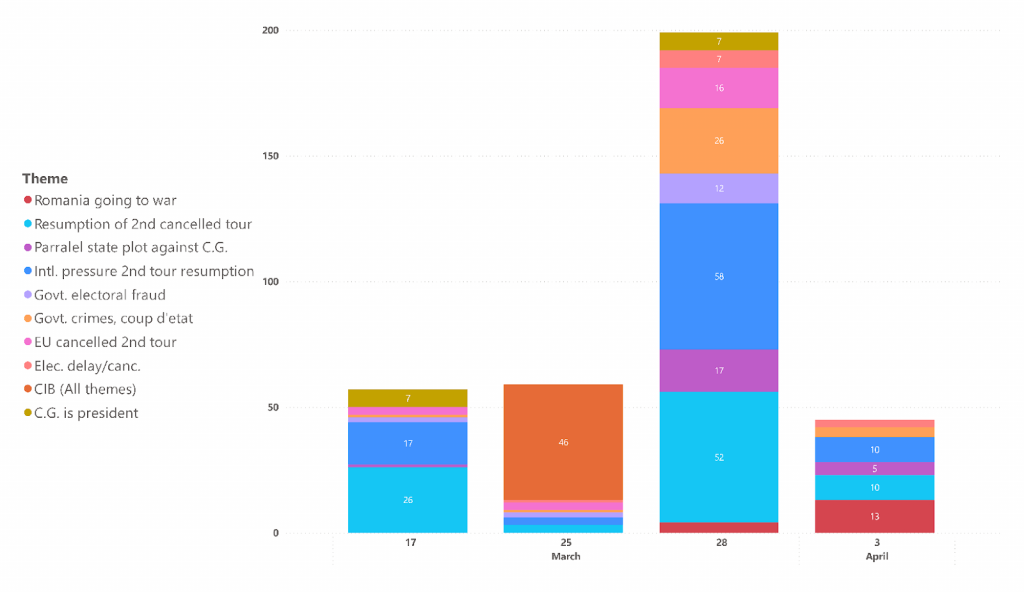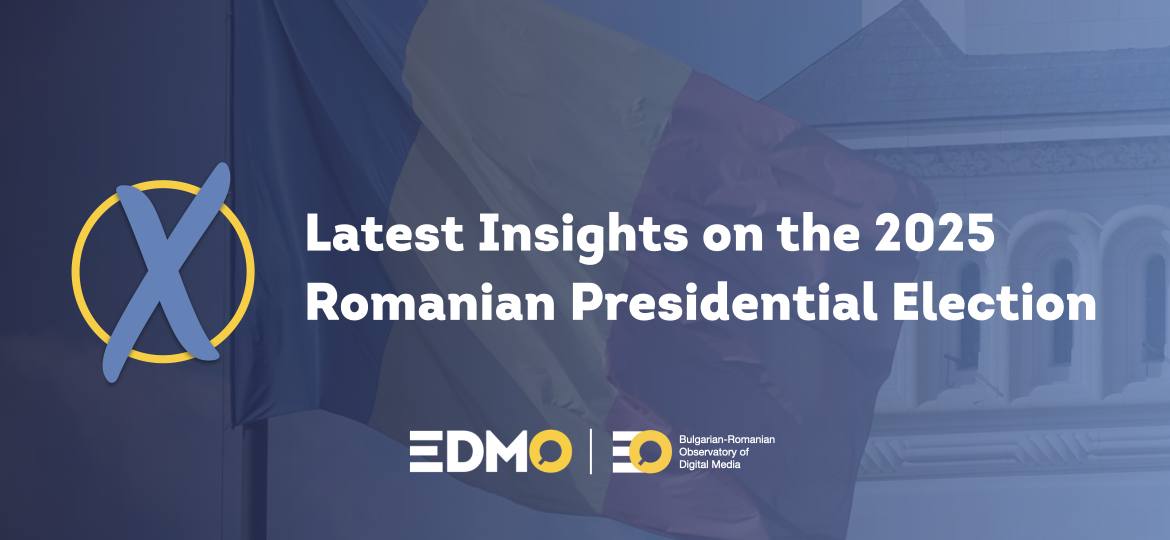Romania’s elections overview – 7 April 2025
This Bulletin is produced and published by Funky Citizens, Member of the Bulgarian-Romanian Observatory of Digital Media (BROD) and the EDMO Fact-Checking Network.
EXECUTIVE SUMMARY
Disinformation efforts in Romania maintain persistent narratives about Călin Georgescu’s legitimacy as their central theme, with coordinated amplification occurring across multiple platforms. Analysis reveals cross-platform coordination in spreading fear-mongering content about imminent war and economic collapse scenarios. Particularly concerning is the increasing distortion of candidates’ actual statements regarding EU-Ukraine relations and social issues, demonstrating a deliberate manipulation of public discourse to create divisive narratives and undermine electoral integrity.
WEEKLY OVERVIEW
The official campaign for Romania’s presidential elections kicked off on Friday, April 4, at midnight and will run for 30 days until May 3rd, with the first round scheduled for May 4th and a second one scheduled on May 18th. Eleven candidates are competing in a political landscape shaped by the controversies of last year’s annulled elections, which were canceled due to suspicions of external interference.
Multiple opinion polls conducted throughout March 2025 show consistent patterns in voter preferences ahead of Romania’s upcoming presidential elections. George Simion (AUR) leads all nine surveys, with support ranging from 27% to 37%, averaging around 31%. The battle for second place remains competitive between three candidates. Nicușor Dan (Independent) polls between 16-26%, Crin Antonescu (A.RO coalition – PSD-PNL-UDMR) shows support between 14-24% and Victor Ponta (independent) ranges from 9-23%.
Elena Lasconi (USR) has significantly lower support, between 3.9-12%. The remaining candidates – Daniel Funeriu, Lavinia Șandru, and others – consistently poll below 3%. These results suggest a likely two-person runoff featuring George Simion, with his opponent still uncertain among Nicușor Dan, Crin Antonescu, and Victor Ponta, depending on late campaign developments and voter turnout dynamics.
On the disinformation front, TikTok and Meta have published transparency reports regarding last year’s annulled elections, but significant questions remain unanswered. TikTok reported removing six Covert Influence Operations networks targeting Romanian audiences and over 5,500 election-related content pieces that violated platform policies. However, the platform failed to explain the sudden virality of content supporting Călin Georgescu just before the first round (November 20-24, 2024), nor did it disclose commercial advertising funds used to promote him. At the same time, TikTok specifies that in December 2024, a network of 27,217 accounts operating through a false engagement provider attempted to promote the AUR political party and independent candidate Călin Georgescu by posting widespread comments; a network of 68 accounts operated from the Republic of Moldova and targeting the Romanian diaspora from Romania attempted to promote Iurie Ciocan and the Social Democratic Party.
The unprecedented annulment of Romania’s presidential election first round by the Constitutional Court marked a critical moment for European democracy, highlighting social media’s potential to undermine electoral processes. These developments were analyzed in depth in our study “Undermining Democracy: The Weaponization of Social Media in Romania’s 2024 Elections’’. This case led the European Commission to formally open proceedings against TikTok under the Digital Services Act. Romanian prosecutors have already placed several TikTok influencers under criminal investigation, including Bogdan Peșchir, who reportedly spent 4.4 million lei to influence votes for Georgescu.
Meta, meanwhile, stated in their latest report regular contact with Romanian authorities including ANCOM, the Digitalization Ministry, the Electoral Bureau, and the Romanian Cybersecurity Agency. The platform created direct escalation channels for five Romanian partners and organized online training sessions with political parties before the elections.
SOCIAL MEDIA DIS and MIS-INFORMATION
A complex web of misinformation centers around Călin Georgescu, portraying him as the rightful president of Romania whose victory was allegedly overturned by a corrupt political and judicial elite. These narratives claim that the second round of presidential elections was unjustly annulled and that both domestic institutions and international powers are involved in a plot to suppress Romanian democracy. A recurring theme is the call for the reinstatement of the second electoral round, often backed by fabricated legal rulings and false endorsements from foreign figures. Supplementary disinformation fuels public anxiety by suggesting Romania faces imminent war and economic collapse, presenting a nation in crisis to justify radical political change and delegitimize the current leadership.

A core narrative claims that Călin Georgescu is the legitimate president of Romania, elected by the people but blocked by corrupt institutions. False claims suggest that Romania annulled democratic elections under pressure from EU and the paralell state and that international figures, including U.S. officials, support Georgescu’s presidency. These posts frame the Constitutional Court and government as illegitimate, demanding the resumption of the second round of elections to restore justice.
A significant volume of content focuses on reinstating the second round of the presidential elections, presenting it as inevitable and legally mandated by national and international courts or foreign governments. These claims often cite false deadlines, fabricated legal documents, and endorsements from global figures, insisting that the electoral process will resume with Georgescu as the frontrunner.
A parallel storyline promotes the idea that a “parallel state” is plotting against Georgescu and Simion as well. Misinformation alleges that Romanian intelligence, judiciary, and political leaders are colluding to disqualify him through manipulation and judicial coups and that Simion’s fate will be the same in the upcoming elections. High-profile accusations, from fabricated statements by international actors to claims of sabotage and arson at government buildings as signs of attepts to cover-up the alleged coup d’etat, portraying Georgescu as a reformist hero under attack by a corrupt and occult parallel state.
Other narratives intensify public fear by claiming Romania is heading toward war or economic collapse. Posts allege secret military mobilizations, forced conscription, and foreign troop deployments under NATO, framing the country as a victim of geopolitical manipulation and being forced into a war with Russia by the EU and France. Simultaneously, economic collapse is portrayed as imminent, with assertions that the government has mortgaged national assets and lost all credibility with foreign lenders, deepening distrust in national leadership. These narratives also connect with election related ones, suggesting that the elections will be suspended or cancelled again by an ilegitimate government.

Explicit calls to violence have been reported in conjunction with these themes, mainly with ones delegitimizing Romanian electoral institutions and presenting an imminent threat to Romanian livelihoods.
FACT-CHECKING CORNER
Based on Factual.ro‘s fact-checking work, we’ve identified several concerning trends in disinformation circulating ahead of the Romanian presidential elections.
Recent fact-checks have highlighted statements from two presidential candidates. Victor Ponta, former Prime Minister and ex-leader of PRO România, made a statement rated as false, claiming the European Union provided no help to Ukraine. This claim ignores the substantial political, financial, and military aid the EU has delivered since the war began. Meanwhile, Nicușor Dan, current Bucharest Mayor and independent candidate with former USR ties, had his statement about civil partnership and same-sex marriage legislation rated as truncated, as it omitted essential context regarding the status and interpretation of the legislative votes he referenced.
Our broader analysis of 74 fact-checked statements from Factual.ro reveals a troubling landscape: 54 statements were rated as false, 7 were lacking context, 2 were partially false, 2 were truncated, and only 2 were verified as true. The main themes of misinformation centered around Ukraine (18 statements), the European Union (29 statements), COVID-19 and vaccination (5 statements), climate change and environmental issues (7 statements), and artificial intelligence (4 statements).
Common fabrications included claims about Romania sending troops to Ukraine, false information about EU military coordination or digital currency policies, COVID-19 vaccine conspiracy theories, and misrepresentations of scientific facts or technologies. Key figures spreading false claims included Diana Șoșoacă (SOS senator), Anamaria Gavrilă (POT deputy), Angel Tîlvăr (Minister of Defense), and Ramona Ioana Bruynseels (former presidential candidate). The vast majority of false or misleading information originated from online sources, often amplifying narratives with nationalist, anti-EU, anti-vaccine, or conspiracy-driven themes.
EXPERTS ANALYSIS & OPINIONS
What makes Romania’s case particularly instructive is how quickly the disinformation playbook evolved after last year’s election annulment. Rather than simply denying institutional legitimacy, actors have built an entire parallel reality with its own internal logic and evidence ecosystem. The question isn’t whether voters will be exposed to this alternative framework—it’s whether reality itself remains a shared reference point in Romanian political discourse.
Romania stands at a fascinating junction where 20th century electoral mechanics meet 21st century information warfare. The resilience we’re witnessing isn’t in our institutions—which remain vulnerable—but in the civic networks forming between journalists, fact-checkers, and digital researchers. It’s like watching neural pathways develop in real-time: messy, fragile, but remarkably adaptive.
Funky Citizens operates at democracy’s intersection points this election cycle. Our accredited observers will document the tangible democratic process in polling stations across the country, while our digital teams track the invisible currents of manipulation online. These parallel efforts capture a singular truth: elections now happen simultaneously in physical space and in information ecosystems. What makes 2025 distinctive is how these realms increasingly influence each other—a narrative engineered online Monday might reshape voter behavior at ballot boxes Sunday.
Elena Calistru, president, Funky Citizens
CONCLUSION
As Romania enters the official presidential campaign period, the disinformation landscape presents serious challenges to democratic discourse. Most concerning is the persistence of false narratives surrounding Călin Georgescu, portrayed as Romania’s “rightful president” whose election was supposedly stolen by corrupt institutions. These claims have evolved into a complex web of misinformation that delegitimizes electoral institutions, promotes conspiracy theories about a “parallel state,” and stokes fears of imminent war or economic collapse.
The timing is particularly troubling, with presidential candidates already making false or misleading statements about critical issues like EU support for Ukraine and LGBTQ+ rights. With George Simion leading in the polls and three candidates competing for a potential runoff position, vigilance against disinformation will be essential as the May 4th election approaches, especially given the unprecedented circumstances following last year’s annulled elections and ongoing investigations into social media manipulation.
This newsletter is part of our ongoing work with the Bulgarian-Romanian Observatory of Digital Media, member of EDMO.
Author: Funky Citizens
